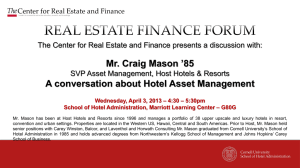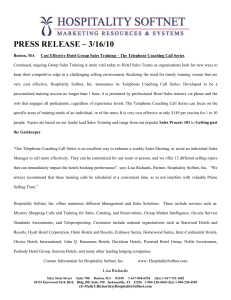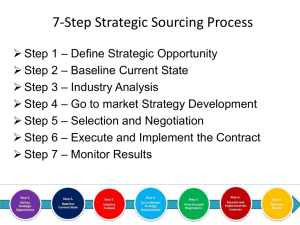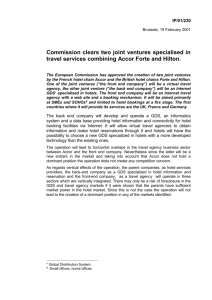Johnson Robert
advertisement
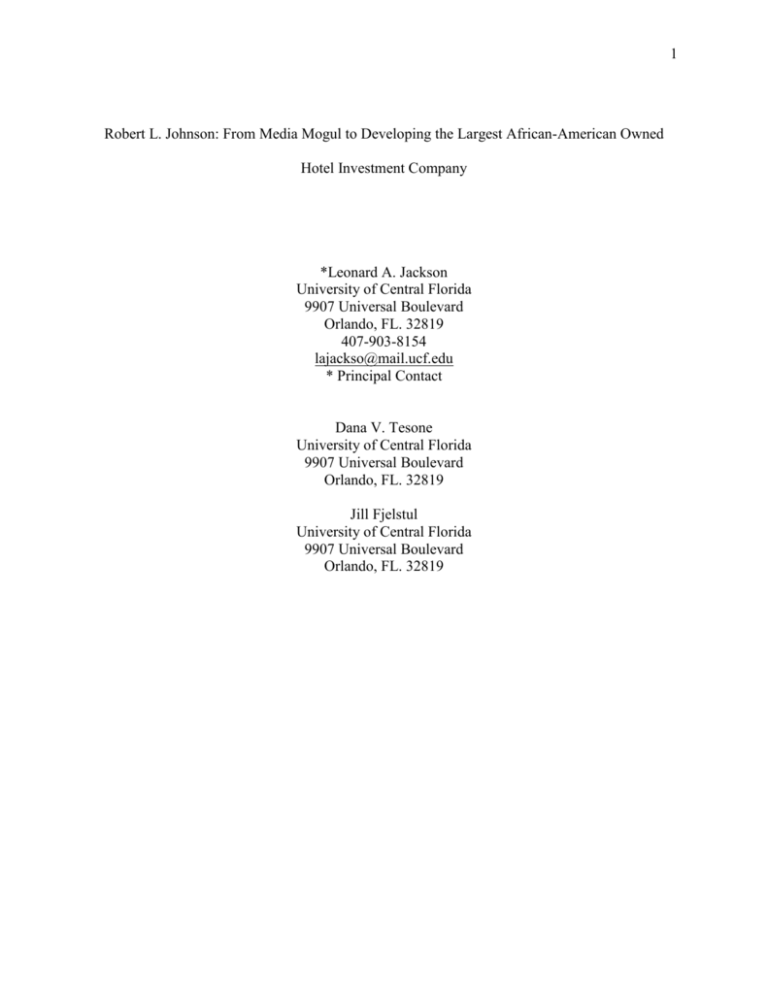
1 Robert L. Johnson: From Media Mogul to Developing the Largest African-American Owned Hotel Investment Company *Leonard A. Jackson University of Central Florida 9907 Universal Boulevard Orlando, FL. 32819 407-903-8154 lajackso@mail.ucf.edu * Principal Contact Dana V. Tesone University of Central Florida 9907 Universal Boulevard Orlando, FL. 32819 Jill Fjelstul University of Central Florida 9907 Universal Boulevard Orlando, FL. 32819 2 Abstract Robert L. Johnson is the co-founder of RLJ Development, the largest African American hotel investment company. At the start of 2008, the company owned 144 hotels with a total of 4,061 guestrooms. Prior to forming RLJ development, Mr. Johnson enjoyed business success as the founder of the iconic media brand, Black Entertainment Television. This article presents the life and entrepreneurial activities of Robert L. Johnson, from his early entrepreneurial activities to the founding of RLJ Development. Keywords: Robert L. Johnson, RLJ Development, Hospitality Entrepreneurs. 3 Introduction Over the course of thirty years, Robert “Bob” Johnson has been aptly and appropriately described as a visionary, strategist, trailblazer, innovator and enigmatic leader. From relatively humble beginnings, Robert L. Johnson rose to become one of America’s most successful entrepreneurs. An astute businessman, Mr. Johnson actively engages in and owns a diverse set of companies. In 2000, after enjoying success as a media mogul, he formed RLJ Development, a privately held hotel real estate investment company, which today is the largest African-American owned hotel investment company. This article presents a profile of Robert L. Johnson and his company, RLJ Development. The article traces his meteoric rise as a businessman and begins with a brief biography of Mr. Johnson and his entrepreneurial activities. The article then looks at RLJ development and concludes with an interview of Mr. Johnson. During the interview, he discusses the role of African Americans in the hospitality industry, his entry into the hospitality industry, RLJ Development, strategies for success in the hospitality industry, his views on leadership, and the importance of the hotel investment cycle. 4 Brief Biography and Entrepreneurial Activities Robert L. Johnson was born on April 8, 1946 in Hickory, Mississippi. At an early age, his parents, Edna and Archie Johnson moved the family to Freeport, Illinois where he spent his childhood, growing up with nine siblings. In 1964, he enrolled at the University of Illinois where he perused undergraduate studies in history. He later enrolled at Princeton University where he majored in international affairs. In 1969, he married Sheila Crump and together they have two children, Paige and Brett. After completing his studies at Princeton University, Mr. Johnson moved to Washington D.C. where he worked as a press secretary for the Honorable Walter E. Fauntroy, Congressional Delegate from the District of Columbia, (USA). He also held positions at the National Urban League. He then decided to pursue a career in the media industry and secured employment with the Corporation for Public Broadcasting. He later joined the National Cable and Telecommunications Associations, a trade association which represented over 1,500 cable television companies. Between 1976 and 1979, he served as vice president of Government Relations for the Association. He also served as a lobbyist for the National Cable Television Association (NCTA). During his tenure with NCTA, the cable industry was in its infancy and Mr. Johnson saw an opportunity to develop his own cable television brand. In 1980 at the age of thirty-three, he obtained a personal loan of $15,000 (Hira, 2006), and with four employees he formed Black Entertainment Television (BET). Black Entertainment Television was a landmark media house since it was the first cable television network that focused specifically on offering programs to an African American audience. The network enjoyed meteoric success and within eleven years, the company achieved another historic milestone when it became the first blackcontrolled company listed on the New York Stock Exchange. In 1998, Mr. Johnson decided 5 once again to privatize BET and bought all its publicly traded stock. In 2000, he sold the company to Viacom for $3 billion. The sale of the company to Viacom allowed Mr. Johnson to achieve yet another milestone as he became the first African American billionaire and the title of the richest African American (Pulley, 2005). In 2005, Mr. Johnson relinquished his managerial control of BET, turning over the titles of President and Chief Operating Officer of the company and turned his attention to developing other business ventures. In 2003, Mr. Johnson made history once again when the National Basketball Association (NBA) granted him the Charlotte Bobcats franchise. This transaction made him the first AfricanAmerican to own the majority interest in a US professional sports organization. Mr. Johnson is also active in the business community, serving on the board of directors, of Hilton Hotels Corporation, US Airways, General Mills, the United Negro College Fund, National Cable Television Association and the American Film Institute. His success as a business leader and involvement in the business community is evident by the numerous awards and honors he received over the years. These include: the 1997 Hall of Fame Award by Broadcasting and Cable Magazine; Cablevision Magazine’s 20/20 Vision Award; NAACP Image Award; National Women’s Political Caucus’ Good Guys Award; and the Executive Leadership Council Award. He is also an inductee in the Cable Television Hall of Fame. Following the sale of BET, Mr. Johnson has focused his entrepreneurial and business activities on his new business venture, RLJ Companies. RLJ Companies is an umbrella company which includes: RLJ Development-a hotel real estate investment company; RLJ lodging fund II and RLJ Real Estate Fund III; RLJ Asset Management Group which comprises RLJ Select Investments, LLC, which is a hedge fund of funds business with Deutsche Asset Management and RLJ Equity Partners, LLC which is a private equity fund formed jointly with The Carlyle 6 Group; Urban Trust Bank, which is a federal thrift institution; RolloverSystems, Inc., a retirement services company; Bobcats Sports and Entertainment, LLC which is the basketball franchise and arena operations; Our Story Films, LLC, a film production studio which was formed to produce urban comedies and family dramas; Casino and Gaming Entertainment, which is a video lottery gaming company that operates throughout the Caribbean and; RLJ/McLarty Landers Automotive, a partnership car dealership that operates in the Southeast and Midwest United States. Essentially, RLJ Companies is a diverse portfolio of companies that provide services in the hospitality industry, sports/entertainment industry, the financial services industry, the real estate industry, the film industry, the gaming industry and the automotive industry. RLJ Development RLJ Development, LLC is a privately held hotel real estate investment company and is the largest African American hotel investment company. The company was co-founded by Robert Johnson, Sheila C. Johnson and Mr. Thomas J. Baltimore, who currently oversees the direct day-to-day company activities. Mr. Baltimore possesses an extensive background in hospitality operations, which includes numerous vice president positions with Hilton Hotels Corporation and the Marriott Corporation. He is highly experienced in development, finance, gaming and operations. Mr. Baltimore was recognized as a recipient of the 1997 Baume & Mercier/Forbes magazine award recognizing “Ten Rising Business Stars of our Time”. The company operates with two affiliates, the RLJ Urban Lodging Fund and the RLJ Lodging Fund II. RLJ Development is currently one of the fastest growing hotel investment companies in the United States and its portfolio of assets continues to grow at a rapid pace. At the start of 2008, the company’s portfolio comprised 114 hotels valued in excess of $2 billion 7 (RLJ Companies, 2008). The firm demonstrates particular expertise in the areas of feasibility, development, finance, as well as depth of knowledge concerning asset and project management. The success of RLJ Development is highly contingent on its ability to hire the nation’s finest hotel management firms to manage and operate its properties. Presently, the company has strong ties with leading lodging corporations such as Hilton, Hyatt and Marriott. These competencies permit RLJ Development to first source and structure attractive asset opportunities. Its expert management team then oversees the valuation of these assets. RLJ Development focuses primarily on its core strategy of acquiring underperforming ‘select service’ and upscale hotels located in dense urban areas and other areas with exceptional barriers to entry. The entrepreneurial spirit of the management team also permits occasional deviations from this core strategy when opportunities arise. Two current examples include projects in downtown Baltimore and the acquisition of a distressed property in Cancun, Mexico. RLJ Development has also entered into new areas of growth. For example, The RLJ Lodging Fund recently acquired the New York LaGuardia Airport Marriott. This transaction marked the inaugural entrance of the company into the New York City lodging market. The company plans to spend in excess of $11.5 million for renovations and repositioning, emphasizing upgrades for the guestroom product. In terms of performance, the company has exceeded expectations. For example, despite less than favorable fluctuations within the lodging industry, RLJ Development has managed to establish performance that exceeds any benchmark by yielding over 20% cash-oncash for its investors (RLJ Companies, 2008). The mission of RLJ drives the firm’s development with exclusive focus on maximizing the value of the real estate holdings. This mission drives a strategy of controlled growth for the firm. The company remains actively 8 engaged in the acquisition, repositioning, renovation, and re-branding institutional quality properties throughout North America and the Caribbean. RLJ Development also completed the closing of its third private equity real estate fund, the RLJ Real Estate Fund III. The primary strategy for the RLJ Real Estate Fund III is for the acquisition and development of upscale, focused service hotels with premium brands in urban markets or major metropolitan dense suburban locations. An expanded goal is to include mixeduse investments in target markets. The RLJ Fund III has 16 institutional investors, with a total purchasing power of approximately $4 billion, including several major public and corporate pension funds, financial institutions, and a dominant hospitality entity. The company’s goal is to deliver superior risk adjusted returns for investors with a focused investment strategy. Such foundation in a slowing economy and tighter credit should create buying opportunities for a wellcapitalized firm. The company’s latest transaction was the acquisition of 22 full and select service hotels from the RLJ Urban Lodging Fund by Inland Real Estate Group of Companies, Inc. This transaction was only surpassed by its 2006 deal when the company entered into one of the largest hotel deals in recent years when it purchased 100 hotels from White Lodging Services for U.S. $1.4 billion (Hotels Magazine, 2006). This recent transaction allowed the company to further diversify its portfolio of hotels which now comprises upper upscale, upscale full and selectservice hotels. These properties are located in the major urban markets of Boston, Baltimore, Chicago, and Washington, D.C. Conversation with Bob Johnson 9 On March 5, 2008, the authors were granted a telephone interview with Mr. Johnson. The purpose of the interview was to gain insight into Mr. Johnson’s background, his career and business ventures, his perspective on African Americans in the hospitality industry, and his views on leadership. The following are excerpts of the interview. How did you get your start as a professional and how did you enter the hospitality industry? Well it’s a fairly simple story. My folks believed that education would open doors of opportunities and they also strongly believed that if you are not afraid of hard work and applied yourself, and displayed honesty and integrity in your work, then you can be successful in whatever ways you choose to define success. That has been my approach to life. I went to college after graduating from high school. After completing a Master’s degree at Princeton University, I went into the cable industry when the industry was in its infancy. I then left the cable industry and started Black Entertainment Television (BET), which turned into a major iconic brand that targeted African American audiences and established itself as the most successful African American business to date. When I sold BET to Viacom, it gave me an opportunity to pursue other businesses that were of interest to me. I also took advantage of the fact that I served on the Board of Hilton for twelve years, to pursue an opportunity in the hospitality Industry. That’s how I got started in the hotel industry, because of my relationship with the CEO of Hilton Hotels and serving on the board of Directors of Hilton. 10 It has been noted that African American parents are reluctant to encourage their children to enter into, or pursue careers in the hospitality industry. Have you experienced this challenge and do you have any ideas you want to share concerning this issue? When I served on the board of the Hilton, I chaired the diversity committee. One of the goals of the committee was to increase the number of minorities employed throughout the hotel system, from top to bottom. One of the challenges in the hotel industry is that for some reason, many African Americans think of the industry as being maids making beds and cleaning the hotels. As a result of this mistaken assumption, they tend to shy away from the industry. It has much to do with a- throwback to a past era, specifically to the type of jobs that were available to African Americans. They could only get jobs cleaning people houses, hotels or buildings. There is certainly a disconnect between what the hospitality industry is and opportunities it offers and the mind-set of some African Americans. Most African American (hospitality executives) do not start in the hotel industry. They have to start somewhere else to climb the ladder. For the most part therefore, there’s a very small pool of talented people (African Americans) to take senior positions in the hotel industry. We need to change that at the operations level. Further, most African Americans are not aware of some of the top hotel schools that are in the country and therefore do not seek out those schools for training purposes. Therefore, more needs to be done in the areas of marketing and promoting the hotel industry, its benefits, salaries, and opportunities for upward mobility in the industry. From the hotel industry’s standpoint, more has to be done to inform minority Americans about the opportunities that exist in the hospitality industry. Opportunities must also be created for minorities to own hotels which would cause many African American to learn about the hotel industry through ownership, friends, relatives, or peers. These are a combination of affirmative things that must be done to awaken the minority community to the hotel industry. This is important because minority Americans are becoming a larger 11 part of the total USA population and a larger part of the business and leisure travel populations. Therefore, we need to do more to get the word out to alert people about the opportunities in the hotel industry. To get more minorities in the system, hotels definitely should be doing more to keep minorities from leaving the system because they don’t see the opportunity to become an assistant GM, a GM or regional GM or the actual owner of a hotel property. What core competencies and skills should students possess before they enter the hospitality industry? The hotel industry is the utmost example of a service industry. It is vitally important that educators stress the importance of good attitudes in the service industry. Educators should also emphasize (to students) the notion that if you don’t have the aptitude or the attitude to be in the service business you’re probably not going to be successful in the hotel industry. The industry is built around making guests feel as if they’re at home, and its truly the notion that the customer is always right. That is fundamentally the cusp of the hotel industry. The focus on service is most fundamental since the customer goes in and out the door every day and whether or not they come back is based on the experience they had at a particular property or with a particular brand. So stressing focus on service is fundamental. Second, the people who succeed in the hotel industry must be comfortable dealing with people from diverse backgrounds. For example, in the hotel industry (employees) will have to deal with people who have achieved the highest level of economic accomplishments, highest level of personal accomplishments, heads of government, or celebrities staying at the hotel. These customers will have diverse needs and expectations. Hotel 12 employees must also be comfortable in recognizing diversity. The same can be said about the employees. The employees of most hotels come from diverse backgrounds, hence, people entering into the industry must be comfortable recognizing that type of diversity and be comfortable with it. So emphasis on diversity is important. Students must also be aware of the importance of brands in the industry. They must understand that hotels rely heavily on brands, and that hotels succeed principally on the notion of building brands into the customer minds, brands that they identify with, so the hotel they consider becomes a part of their lifestyle. For example, some people will say my lifestyle is a Double D, or a Marriot, or a Four Seasons type of life style. Therefore, if you’re going to be successful it is important to recognize the importance of brands and learn how to preserve its integrity and ensure that anytime customers have an interaction with the brand, the brand’s equity is reinforced in a way that meet manager’s expectations. So in summary, those are the three things that are critical for career success in the hotel industry. From a business standpoint, its an economic business model which ranges from which hotel to buy, which market to go in, what’s the likelihood of competition, what’s the likelihood of new capacity coming into the marketplace, the issue of continuing to improve the property, keeping it up to date, increasing the value of the property customer expectation, cost of capital when you acquire a hotel the cost as well as whether you build or you buy all of these things is the business side of the hotel, as opposed to the operational side of the hotel. Do you see your company evolving from an asset ownership company to a management company? 13 We are principally a hotel private equity fund. We basically raise capital from state and corporate pension funds and we invest money into real estate assets. We manage the properties for our investors and we improve the value of the property through property management. We then make the decision at the appropriate time to exit the hotel with the goal of profit maximization for our (pension) investors. We are not into the property operations management side of the business. Part of the reason is that we are buying hotels that are principally owned by major brands such as Hilton and Marriot, both of whom are very aggressive and capable management companies. Therefore, it could present us with something of a conflict of interest if we were buying hotels and then replacing management within those brands. Therefore, we decided that our best core strategy is to buy hotels that are either managed by others or specifically managed by Hilton or Marriott. Therefore, we focus on managing and improving the value of the hotel as a real estate asset. Can you comment on the importance of paying attention to the hotel investment cycle? We definitely pay close attention to the investment cycle. It is a realistic way of measuring when its time to get in the market and a time to get out of the market. The decision depends on the introduction of capacity into the market you’re in or you’re planning to go into. We therefore have to decide whether or not the market is economically viable to bring on new properties based on factors such as unavailability of land or because of the growth in the marketplace, access to capital, new products entering the marketplace, room supply in the marketplace, access the debt and credit margin. Therefore, you have to be cognizant of the investment cycle in terms of when to buy and when to sell and how to quickly underwrite the assets that you are buying. 14 We learned that even on the management side of the business it is important for everyone in the business to thoroughly understand asset valuation. Therefore, from your prospective do you feel it is important to thoroughly train our potential graduates to understand that aspect of the business? It is very important that they understand that part of the business even though very few of them maybe involved in the process of acquiring properties. However, they will be involved in management of the asset in some capacity. Therefore, it is important for them to understand why it is important to make sure the property is cost efficient in every aspect especially as it pertains to food and beverage, housekeeping, property improvement obligations, as well as everything related to the tax structure of the municipalities where the hotels are located. All these factors are important in determining the value of the assets and the return on investments. Having an understanding that the hotel is simply not a collection of beds, and a restaurants, but really a business which must be run from top to bottom based on the value of what you paid against the value of what you can sell clearly is something that everyone in the hotel business should know, especially those who see it as a career path. It does not matter what the student’s area of focus is since the ultimate goal is the value of the assets. All hotel business transactions should be looked at from a profit perspective and should only be undertaken if it enhances the overall value of the asset. You can see this from the perspective that hotels are purchased based on some multiple of their earnings, or some multiple of their overall sales. Therefore, improving sales or each sector of performance centre clearly is a part of the investment centre. So if your hotel is going to open a spa you really have to look at that investment and the return on the investment, and what it would mean to the overall hotel 15 evaluation. You can’t go out and spend money on improvements without first examining the returns on the investment. All parties involved must look at the overall hotel and look at every item focusing on return on capital or return on investment. You simply cannot go out and spend money to improve a particular part of the hotel if you don’t first understand where the return from that investment will be coming from. If you can’t see a return on capital then it tells you one thing. Either you shouldn’t do it or this property is not a financial investment you should seriously consider. This analysis is fundamental. For example, all the people who work in asset management for our company will look at every item of capital expenditure to see if a return on investment or a return on capital will meet our desired goals. What are your views on leadership and what are the attributes of a good leader? The fundamental part of leadership is you have to be able to convince people to follow you. It’s not possible to be a leader if you don’t have anyone to follow you. That’s where leadership starts. The way you do that is you have to present people with a vision or an objective or goal of what you’re trying to achieve, and convince them that they want to be part of that. You also have to convince them that you have the ability to execute that objective, vision, or strategy. Good leadership also requires that you ensure that you’re getting the right people to help you execute your vision and that you provide them with the necessary resources that will enable them to enter into appropriate strategic relationship. A good leader also creates strength of core values for the company that everyone understands and believes and then allow the people or personnel involved with you to pursue their best. Fundamentally, that’s what I’ve done in every business that I’ve started. 16 Briefly tell us about your core values and “recipe for success” for your companies. We approach everything with the notion that we want to be the best at everything we do. We also commit ourselves to operating with total integrity with all of our stake owners, whether they are our employees or vendor. We want to be transparent so that people clearly understand what we do and also to show that we have nothing to hide. opportunities where we feel we can be successful. In terms of growth, we look for We want to be there first and get the advantage of being the first mover in an area. This is of particular importance if you are a minority company since there are tremendous benefits to being a first mover. For example, you get the attention that comes with it and you also get the relationships first with companies that you’re doing business with. We also try to create a company that is able to attract other top minority talent because they’re aware of whom we are. Our success is also reinforced by the larger companies that we do business with and it is a great way to attract talented people. We pride ourselves on trying to find the best people to do the job not because they’re African American, but because people know we pride ourselves on creating values and providing great career opportunities. Therefore, we attract a lot of minority talent because they see this as a great opportunity to rise to the top whereas in another firm they may face somewhat of a glass ceiling in their ability to get to the next rung or that next level. Are your companies involved in any CSR initiatives and can you elaborate on your philanthropic activities? 17 CSR is practiced at the hotel level since they are managed separately. Personally, I keep in mind that we’re investing other people’s money and they have their own CSR functions that they do with their money. They’re looking to us for a return on their investments. We are a private equity real estate management firm, we buy and we sell. So our people focus on buying and selling as our primary goal. CSR is not as ingrained as it would be if we were a corporation. All of our hotels are managed by management companies that have their own localized CSR. At the corporate level we engage in philanthropic activities. This could range from things such as sponsoring events, buying a table at fund raisers to making a donation or supporting an organization. In addition, some of our pension fund groups have things that they support. Conclusion By all accounts, Robert L. Johnson has been successful as a leader and entrepreneur. He has made a successful transition from media industry to a developing the largest African American owned hotel investment company. He credits his parents for instilling the value of a good education and good work habits, which he noted are essential tools for success. RLJ development has achieved tremendous success in its early years. All indications are that as long as Robert Johnson remains at the helm, the company should continue to grow and develop into one of the America’s leading hotel investment company. 18 References Hira, N. A. (2006, May 1). Mr. Johnson Goes to Wall Street. Fortune, 153(8), 118-121. Hotels Magazine (2006, December). Power Hitter. Hotels' Investment Outlook, 9(4), 25-28. Pulley, B. (2005). The Billion Dollar BET: Robert Johnson and the Inside Story of Black Entertainment Television (1st ed.). New York: John Wiley & Sons, Inc. RLJ Companies (2008). The RLJ Companies. Retrieved April 14, 2008, from http://www.rljcompanies.com/



